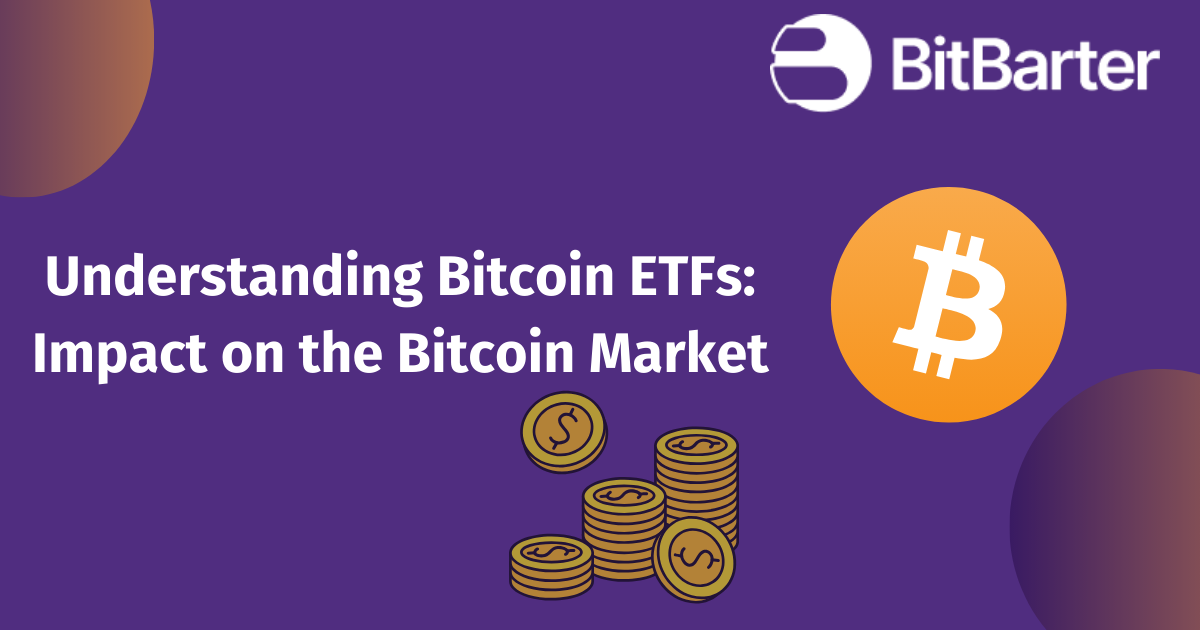Understanding Bitcoin ETFs: Impact on the Bitcoin Market

In recent years, Bitcoin has emerged as a popular investment asset, drawing the attention of both individual and institutional investors. One significant development in the world of Bitcoin investment is the introduction of Bitcoin Exchange-Traded Funds (ETFs). This blog post aims to explore what Bitcoin ETFs are, how they function, and their potential impact on the Bitcoin market.
What is a Bitcoin ETF?
A Bitcoin Exchange-Traded Fund (ETF) is a financial product that tracks the price of Bitcoin and allows investors to buy and sell shares of the fund on traditional stock exchanges. Essentially, it enables investors to gain exposure to Bitcoin without actually owning the cryptocurrency itself. Instead of purchasing Bitcoin directly from an exchange, investors can buy shares of the ETF, which represent ownership of Bitcoin held by the fund.
How do Bitcoin ETFs work?
Bitcoin ETFs function similarly to traditional ETFs. They are managed by fund managers who are responsible for buying and holding Bitcoin on behalf of investors. The fund manager creates and redeems shares of the ETF based on investor demand. When investors buy shares of the ETF, the fund manager uses the proceeds to purchase Bitcoin. Conversely, when investors sell shares of the ETF, the fund manager may sell Bitcoin to meet redemption requests.
Impact on the Bitcoin Market:
- Increased Accessibility: Bitcoin ETFs make it easier for traditional investors to gain exposure to Bitcoin. By offering a familiar investment vehicle traded on regulated exchanges, ETFs attract a broader range of investors who may have been hesitant to invest directly in Bitcoin.
- Liquidity Boost: The introduction of Bitcoin ETFs can potentially increase liquidity in the Bitcoin market. As more investors participate through ETFs, trading volumes and liquidity may rise, leading to reduced price volatility.
- Price Discovery: Bitcoin ETFs could contribute to price discovery in the Bitcoin market. As ETFs track the price of Bitcoin, their trading activity reflects investor sentiment and demand, providing valuable insights into market trends.
- Regulatory Scrutiny: Bitcoin ETFs are subject to regulatory oversight, which may influence their operation and impact on the market. Regulatory approval or rejection of ETF proposals can affect market sentiment and investor confidence.
- Competition and Innovation: The launch of Bitcoin ETFs may spur competition and innovation in the cryptocurrency market. As traditional financial institutions enter the space through ETFs, they may introduce new products and services, driving further development and adoption.
Conclusion:
Bitcoin ETFs represent a significant development in the evolution of Bitcoin as an investable asset. By providing a regulated and accessible investment vehicle, ETFs have the potential to attract a broader investor base and increase liquidity in the Bitcoin market. However, their impact on price volatility, market sentiment, and regulatory landscape remains to be seen. As the popularity of Bitcoin ETFs grows, monitoring their effects on the Bitcoin market will be crucial for investors and regulators alike.
With the introduction of Bitcoin ETFs, the Bitcoin market enters a new phase of maturity and integration with traditional finance. As the landscape continues to evolve, understanding the dynamics of Bitcoin ETFs and their implications will be essential for navigating the ever-changing cryptocurrency market.
Would you consider investing in a Bitcoin ETF?
Visit www.bitbarter.io